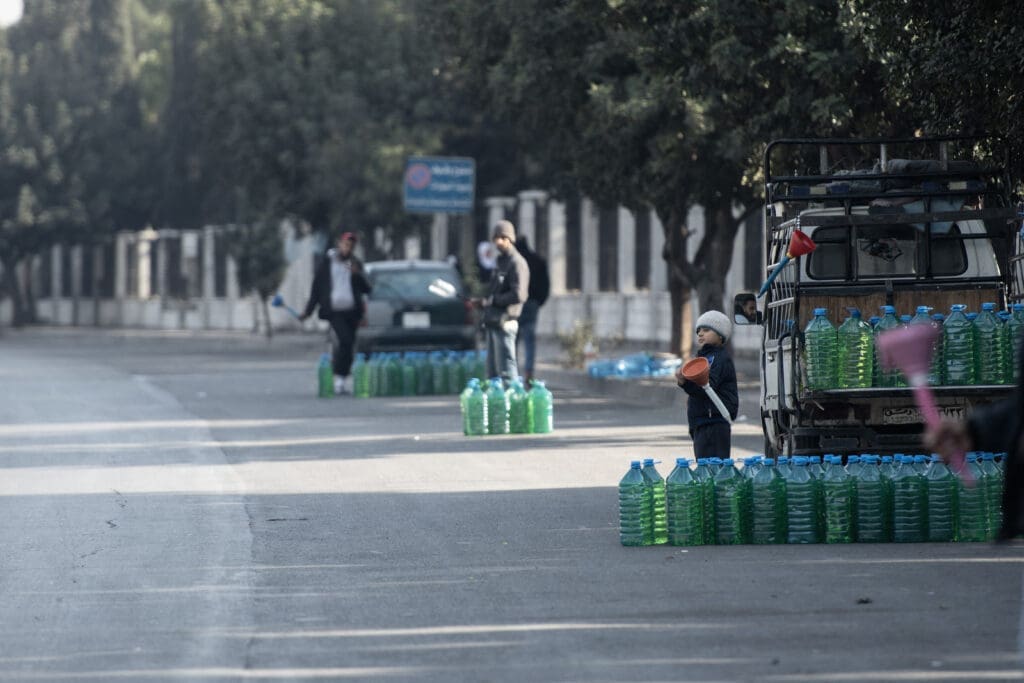Since 1997, the U.S. State Department has compiled a catalog of organizations it considers foreign terrorists. The FTO list, as it is known, has become a powerful tool in Washington’s “war on terror,” by subjecting parties on the list to the weight of American delegitimization and economic sanctions. Moreover, the qualification and threshold for being listed are relatively arbitrary, largely in the hands of the Secretary of State and what is deemed a threat to the security and interests of either America or its allies.
In 2012, as Syria descended into civil war and new jihadist groups formed and rose to the forefront of the armed opposition, the U.S. included Jabhat al-Nusra—the precursor to today’s Hayat Tahrir al-Sham (HTS)—on the FTO list. The following year, Washington placed the group’s “emir,” Ahmed al-Sharaa (then known by his nom de guerre Abu Mohammed al-Jolani), on its “Specially Designated Global Terrorist” list. As Jabhat al-Nusra evolved and changed its name to Jabhat Fatah al-Sham (JFS) in 2016, before merging with other jihadist groups to establish HTS in 2017, the FTO designation followed suit.
Yet with the surprise toppling of Bashar al-Assad’s regime in Syria in late 2024 by an HTS-led coalition and subsequent formation of a caretaker government headed by al-Sharaa, the FTO designation of HTS came to represent both an obstacle and point of leverage for Washington in its engagement with Damascus. In December 2024, the Biden administration sent a delegation to the Syrian capital to meet with its new leadership, but first it had to lift a $10 million bounty on al-Sharaa’s head. A few weeks later, reports emerged alleging that the Biden administration and Syria’s HTS-dominated government were sharing intelligence regarding the Islamic State (ISIS).
Although the FTO designation on HTS remains in place, President Donald Trump’s new administration also understands that U.S. national interests require it to engage with its new Syrian counterpart. Still, whether or not to remove HTS from the State Department’s FTO list is at the heart of an intense and ongoing debate.
In certain ways, the Trump team is optimistic about what Assad’s fall in Syria can mean for U.S. interests in the future, specifically as it relates to ejecting Iran and Hezbollah from the country. Nonetheless, officials in the Trump administration, especially those who are staunchly anti-Islamist—if not outright Islamophobic—are deeply suspicious about HTS, its roots, the nature of its rise to power, and its intentions in post-Assad Syria.
As much as the Trump administration seems to recognize the need to pragmatically approach HTS, the U.S. is likely not on the verge of de-listing the organization. Interested in the actions—not the rhetoric—of Syria’s Islamist rebels-turned-rulers, the Trump administration appears in no hurry to reach conclusions. Although Trump could instantly remove HTS from the FTO list, given that Secretary of State Marco Rubio has the authority to revoke such a listing at any point, the fact of the matter is that de-listings tend to follow drawn out internal deliberations among top national security officials in Washington, subjecting the process to “general institutional inertia.” As such, a move to de-list might not take place for years.
Questions about what the Trump administration might do if HTS formally disbands seem to lead only to more questions. Although al-Sharaa has expressed his desire to dissolve HTS, it remains unclear what that would actually entail in practice. As of now, HTS has not made any formal decision on its future. These questions are complicated by the fact that HTS went from being a non-state actor controlling Idlib to now being a group whose members dominate Syria’s caretaker national government. Aside from Hamas’ electoral victory in the 2006 Palestinian Authority elections, there is no precedent for an FTO-listed group becoming a ruling government in a state or entity that has relations with the United States.
Despite the prohibition on engagement, Washington appears to be exploiting the gray zone between HTS and the new Syrian government, for now. Nonetheless, keeping HTS on the FTO list only serves to complicate Washington’s relationship with post-Assad Damascus. This designation makes dealing with HTS “radioactive” because the listing criminalizes assisting, funding or advising the organization, subjecting those who do to harsh punishments, including decades behind bars and financial penalties up to hundreds of millions of dollars. Now, with HTS functioning as the caretaker government, this listing could create serious legal risks and administrative burdens for U.S. companies and humanitarian organizations seeking to deal with post-Assad Syria.
These issues alone, however, are unlikely to lead to the Trump administration determining that quickly de-listing the former al-Qaeda offshoot would be prudent. Ultimately, the factors that stand to impact the White House’s cost-benefit analysis regarding this de-listing question relate to the following five issues.
First is the position of al-Sharaa’s government toward Israel. So far, the new administration in Damascus has not been outwardly hostile toward Israel and has instead exercised restraint even in the face of Israeli bombardments and occupation of more Syrian land. If the HTS-led government maintains this non-confrontational approach to Israel, that would increase the odds of the Trump administration moving toward a de-listing.
Second is the standing of Iran and Hezbollah in Syria. Since taking power two months ago, al-Sharaa’s government has signaled its determination to deny Iran the means to use Syrian territory to send arms to Hezbollah, while also refusing to cooperate with the Lebanese organization as the Assad regime did in the past. The new Damascus government maintaining this posture vis-à-vis Iran and Hezbollah would bode well for the prospects of the U.S. de-listing HTS.
Third is the issue of ISIS. At this stage, the new authorities in Damascus have yet to consolidate power across all of Syria, and it is unclear if or when the U.S. will see al-Sharaa’s administration as a fully competent and trustworthy partner in the fight against the Islamic State. Yet, if, over time, Syria’s new government demonstrates a firm will and commitment to combatting ISIS, that could increase the chances of Washington de-listing HTS sooner than perhaps some analysts might expect. It should be noted, however, that the continued implementation of U.S. sanctions on post-Assad Syria greatly inhibit the new government’s ability to cement its control across the entire country and thus make cracking down on ISIS much more challenging.
Fourth is the standing of Syria’s Christian minority under HTS rule. The Trump administration would be more likely to de-list HTS after the new Syrian government demonstrates a firm commitment to respecting the human rights and dignity of the country’s Christians and protecting their security.
Fifth is the relationship between the new Syrian government and jihadist groups with international agendas. The Trump administration will not want to be seen as “legitimizing” HTS if it supports transnational jihadist groups that are seeking to attack Western targets. For now, it appears that the expatriate jihadist groups allied with HTS in Syria are those such as the Turkistan Islamic Party, which have their sights set on China, and it is unclear how much of a problem the Trump administration will see in them having positions of power in the “New Syria.” Late last year, for instance, Syria’s new authorities announced the appointment of Chinese Uyghurs and foreign fighters from Jordan and Türkiye to senior official posts in the country’s military, amid its reorganization by HTS.
In the final analysis, the question of de-listing HTS is controversial inside Washington, and it is uncertain if or when the Trump administration would choose to do so. The decision is ultimately political in nature and not so much about literal terrorism. Mindful of Syria’s geopolitical value to the U.S. and other Western countries, it might be just a matter of time until Washington eventually takes steps to “legitimize” HTS if the group maintains its hold on power. The more that Syria’s rebels-turned-rulers can demonstrate to Trump’s team that they deserve to be seen by Washington as trustworthy, the more plausible a de-listing might become, yet the new U.S. administration is unlikely to rush this process.


